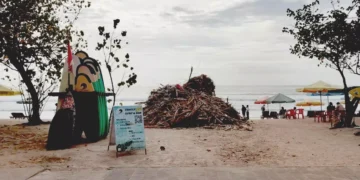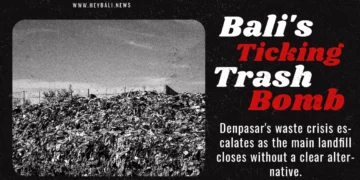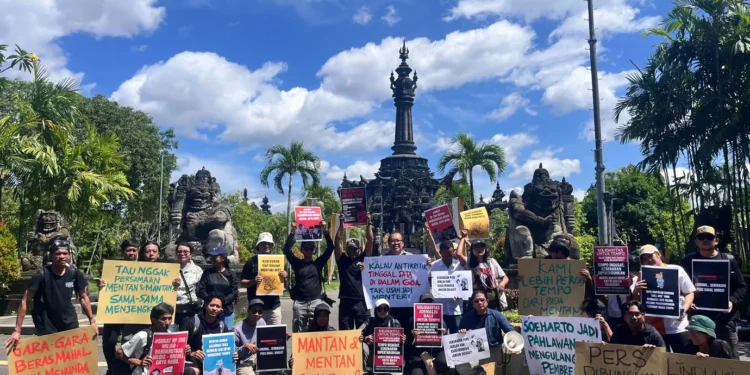DENPASAR, SLAPP lawsuit– In a striking display of solidarity, journalists and civil society activists in Bali have taken to the streets, denouncing a massive defamation lawsuit filed by Indonesia’s Agriculture Minister against one of the country’s most prominent investigative media outlets, Tempo. The case, they warn, represents a clear and present danger to press freedom in the world’s third-largest democracy.
The protest, organized by the Bali Journalists Solidarity (Solidaritas Jurnalis Bali/SJB) on Sunday, November 16, 2025, was a direct response to Agriculture Minister Amran Sulaiman’s civil suit demanding Rp 200 billion (approximately USD $12.2 million) in damages from Tempo.
A “SLAPP Suit” and the Proper Channels for Dispute
At the heart of the controversy is a SLAPP lawsuit—a Strategic Lawsuit Against Public Participation. Such litigation is not designed to win in court, but to burden critical voices with the crippling cost and psychological stress of a legal battle.
“What Tempo is experiencing is a danger alarm for press freedom,” said Ni Kadek Novi Febriani, the action’s coordinator. “This SLAPP lawsuit is an attempt to intimidate. It’s a tactic typically used against those who speak out loudly.”
She emphasized that disputes over news coverage should be resolved through the mechanisms enshrined in Indonesia’s Press Law, namely the right of reply and mediation by the independent Press Council, not through the civil courts. This view is bolstered by a recent Constitutional Court ruling which states that defamation charges should be directed at individuals, not government institutions or their leaders.
The dispute stems from a Tempo report published in May 2025 with the cover title “Polishing Rotten Rice.” The article investigated a government policy where the state logistics agency, Bulog, absorbed rice from farmers at a fixed price, regardless of quality. The report claimed this led to perverse incentives, with some farmers allegedly wetting their good-quality grain to increase its weight, ultimately causing it to spoil.
Minister Sulaiman, a public official, claims the report damaged his reputation and that of the Ministry of Agriculture.
Resolution Ignored: A Case Already Settled by the Press Council – SLAPP Lawsuit
A critical element complicating the Minister’s case is that the official press oversight body had already adjudicated the matter. Following a complaint, the Press Council issued a formal Statement of Assessment and Recommendation (PPR) in June 2025.
The Council found that Tempo had violated the Journalistic Code of Ethics on two counts: inaccuracy/exaggeration and mixing facts with opinion. It recommended Tempo change the headline, issue an apology, and moderate the content—all of which Tempo complied with within the mandated 48-hour window.
Despite this resolution through the proper channel, Minister Sulaiman proceeded with his colossal civil suit at the South Jakarta District Court in early July.
“If the judge grants Amran’s lawsuit for Rp 200 billion, it would set a terrible precedent for press freedom and pose a grave danger to the democratic climate, as it is a form of silencing the press,” Febriani explained. “We call on the judges to reject the Minister’s lawsuit in its entirety. This will not only happen to Tempo; it is a warning signal for all media.”
The demonstrators in Bali presented a five-point statement of demand, calling for the immediate withdrawal of what they term a “new-style censorship” and urging the courts to protect media independence. This SLAPP lawsuit against Tempo is being watched closely, as its outcome will send a definitive signal about the health of Indonesian democracy and the risks faced by a press that holds power to account.
Reporting from the rally in Denpasar, Hey Bali journalist Ferry Fadly captured the palpable tension and resolve, noting that for the local press corps, this is not a distant legal battle, but a direct fight for their right to report.
















































